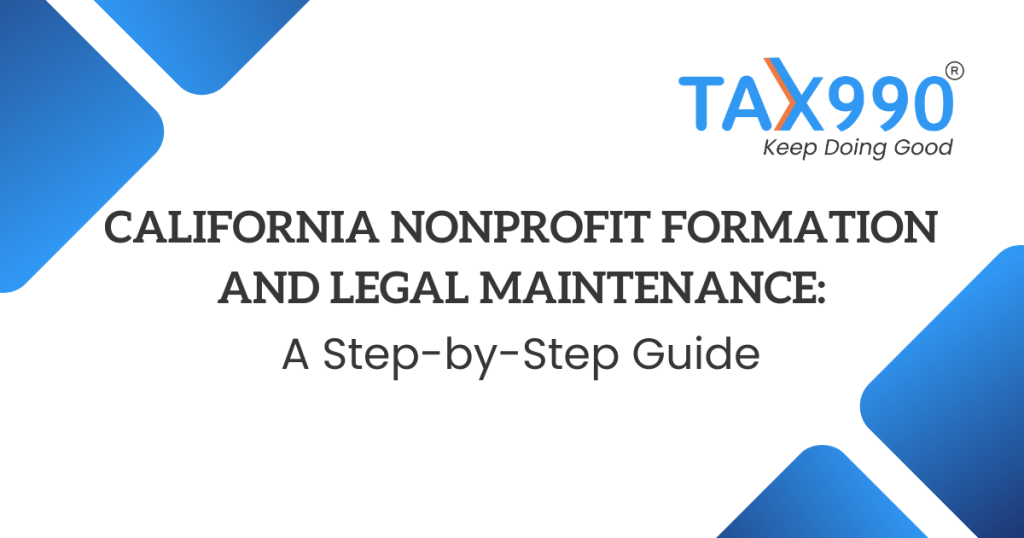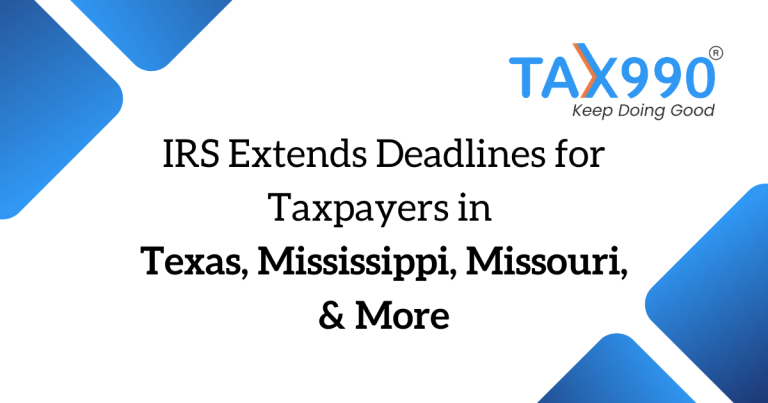California Nonprofit Formation and Legal Maintenance: A Step-by-Step Guide
Estimated reading time: 12 minute(s)

Starting a nonprofit in California is a meaningful way to drive change, but it involves more than just a mission. From incorporation and tax exemption to meeting annual filing requirements, California’s nonprofit formation process requires careful attention to legal and administrative steps at both the state and federal levels.
In our previous blog, we explored the nonprofit formation process in Florida. Now, we shift our focus to California, one of the most active states in the nonprofit landscape. With guidance from the Tax990 California Nonprofit Compliance Guide, here’s a complete overview of how to establish and maintain a nonprofit in the Golden State.
Registering your nonprofit in California
The first official step is to register your nonprofit by filing the Articles of Incorporation with the California Secretary of State. This establishes your organization as a legal entity in the state.
Once incorporated, and before your nonprofit can solicit any donations, it must register with the California Attorney General’s Registry of Charitable Trusts by submitting Form CT-1 (Initial Registration).
Getting an EIN for your organization
After incorporation, your organization must obtain an Employer Identification Number (EIN) from the IRS. This EIN serves as your nonprofit’s federal tax ID and is essential for banking, hiring, and all federal and state tax filings, even if your organization doesn’t have employees.
Applying for tax-exempt status
Federal tax exemption
To be exempt from federal income taxes and enable donors to make tax-deductible contributions, your organization must apply for 501(c)(3) status through the IRS. This can be done by submitting Form 1023 or, if eligible, the streamlined Form 1023-EZ. Approval from the IRS officially recognizes your nonprofit as federally tax-exempt.
State tax exemption in California
Receiving federal tax-exempt status doesn’t automatically exempt your organization from California state taxes. To gain exemption at the state level, you must submit a separate application to the California Franchise Tax Board (FTB). You’ll either file Form 3500 if you don’t yet have a federal determination letter or Form 3500A if you do.
Meeting Annual Filing Requirements
Federal annual filings
To maintain your federal tax-exempt status, you’re required to file one of the IRS Form 990 series each year. The appropriate form—Form 990, 990-EZ, 990-N, or 990-PF—depends on your organization’s size and activity. These forms are due by the 15th day of the fifth month following the end of your fiscal year.
Tax990 simplifies the filing process by supporting all versions of the IRS Form 990, offering step-by-step guidance, built-in checks, and instant status updates to help you file confidently and stay compliant.
California state filing requirements
Franchise Tax Board (FTB)
Nonprofits are also required to file annually with the California Franchise Tax Board. Form 199 is required for organizations with gross receipts above the threshold, while smaller organizations can file Form 199N. Private foundations must file Form 199 as well. If your organization generates $1,000 or more in unrelated business income, you’ll also need to submit Form 109.
With Tax990, you can easily file CA Form 199 online, right alongside your federal 990 return, streamlining your state and federal compliance in one secure platform.
Secretary of state requirements
Every nonprofit must file a Statement of Information (Form SI-100) with the California Secretary of State every two years to keep key organizational details up to date.
Attorney general’s registry of charities and fundraisers
To maintain your charitable registration, your organization must submit Form RRF-1 annually. If you’re not required to file Form 990 or 990-EZ with the IRS, you’ll also need to file Form CT-TR-1. These documents are due four months and 15 days after the end of your fiscal year.
Conclusion
Starting a nonprofit in California is both fulfilling and complex. From registering your organization and securing tax exemptions to maintaining annual compliance, every step plays a critical role in your nonprofit’s success and long-term sustainability.
Tax990 is here to help simplify that journey. Whether you’re filing your IRS Form 990 or completing your California Form 199, our platform guides you every step of the way with accuracy, ease, and expert-backed support.
Stay tuned for our next post, as we continue to explore nonprofit formation and compliance across the United States.




Leave a Comment